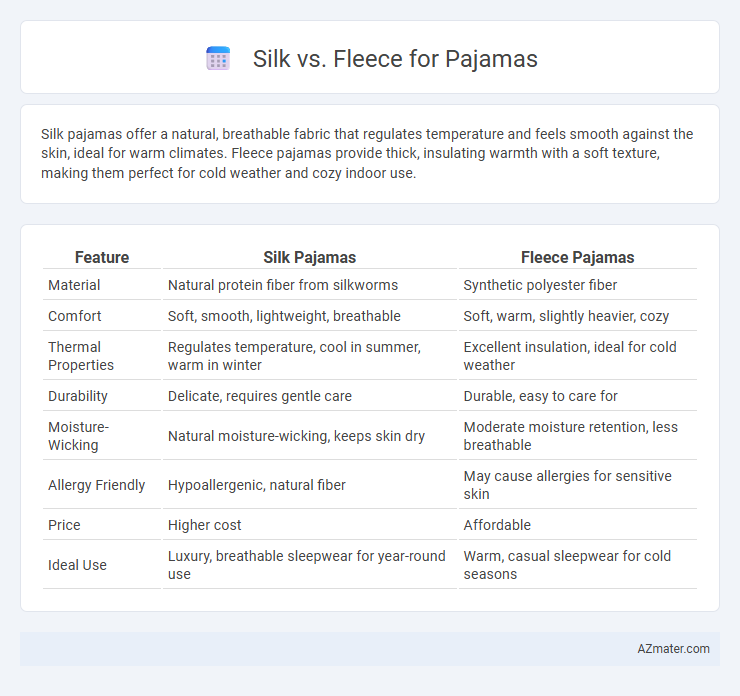Silk pajamas offer a natural, breathable fabric that regulates temperature and feels smooth against the skin, ideal for warm climates. Fleece pajamas provide thick, insulating warmth with a soft texture, making them perfect for cold weather and cozy indoor use.
Table of Comparison
| Feature | Silk Pajamas | Fleece Pajamas |
|---|---|---|
| Material | Natural protein fiber from silkworms | Synthetic polyester fiber |
| Comfort | Soft, smooth, lightweight, breathable | Soft, warm, slightly heavier, cozy |
| Thermal Properties | Regulates temperature, cool in summer, warm in winter | Excellent insulation, ideal for cold weather |
| Durability | Delicate, requires gentle care | Durable, easy to care for |
| Moisture-Wicking | Natural moisture-wicking, keeps skin dry | Moderate moisture retention, less breathable |
| Allergy Friendly | Hypoallergenic, natural fiber | May cause allergies for sensitive skin |
| Price | Higher cost | Affordable |
| Ideal Use | Luxury, breathable sleepwear for year-round use | Warm, casual sleepwear for cold seasons |
Introduction: Choosing the Right Pajama Fabric
Silk pajamas offer a smooth, breathable fabric ideal for regulating body temperature and providing luxurious comfort, while fleece pajamas provide superior warmth and softness, perfect for cold weather. Selecting the right pajama fabric depends on personal preferences for temperature control, texture, and seasonal needs. Understanding the specific properties of silk and fleece helps ensure a comfortable and restful night's sleep.
Silk vs Fleece: An Overview
Silk pajamas offer a lightweight, breathable fabric that naturally regulates temperature, making them ideal for both warm and cool nights. Fleece pajamas provide superior warmth and softness due to their dense synthetic fibers, which trap heat efficiently. Choosing between silk and fleece depends on the desired balance between temperature regulation and insulation for sleepwear comfort.
Comfort and Feel: Silk Versus Fleece
Silk pajamas offer a smooth, lightweight texture that feels cool and luxurious against the skin, ideal for regulating body temperature in both warm and cool climates. Fleece pajamas provide a soft, plush, and insulating feel, perfect for colder nights due to their ability to retain heat effectively. The comfort of silk lies in its breathability and moisture-wicking properties, while fleece excels in warmth and cozy softness.
Breathability and Temperature Regulation
Silk pajamas excel in breathability due to their natural protein fiber structure, allowing air circulation and moisture-wicking properties that keep the skin cool and dry. Fleece, made from synthetic fibers, offers warmth and insulation but tends to trap heat and moisture, making it less effective for temperature regulation in warmer conditions. For those prioritizing breathability and efficient temperature regulation, silk is the superior choice for comfortable sleepwear.
Moisture-Wicking Capabilities
Silk pajamas provide excellent moisture-wicking capabilities by naturally drawing sweat away from the skin, keeping the wearer cool and dry throughout the night. Fleece, while warm and soft, tends to retain moisture, which can lead to a clammy feeling in humid or warmer conditions. For optimal moisture management in sleepwear, silk is the superior choice due to its breathable, lightweight, and absorbent fiber structure.
Hypoallergenic Properties Comparison
Silk pajamas boast natural hypoallergenic properties, resisting dust mites, mold, and mildew, making them ideal for sensitive skin and allergy sufferers. Fleece, while soft and warm, can attract dust and allergens more easily due to its synthetic fibers. Choosing silk pajamas can significantly reduce allergic reactions, promoting better skin health and comfort during sleep.
Durability and Longevity
Silk pajamas are prized for their luxurious softness and natural hypoallergenic properties, but they tend to be less durable due to the delicate fibers that require careful hand washing and maintenance. Fleece pajamas offer superior durability and longevity, as their synthetic polyester construction resists pilling, shrinking, and wear even after frequent machine washing. Over time, fleece maintains its insulating properties and vibrant appearance, making it a practical choice for long-lasting, everyday pajama use.
Care and Maintenance Requirements
Silk pajamas require gentle hand-washing with mild detergent or dry cleaning to maintain their smooth texture and prevent fabric damage, while avoiding exposure to direct sunlight. Fleece pajamas are machine washable and durable, often requiring cold water cycles and low heat drying to preserve their softness and prevent pilling. Both fabrics benefit from careful storage away from moisture and sharp objects to extend the life of the sleepwear.
Price Comparison: Silk vs Fleece Pajamas
Silk pajamas typically cost significantly more than fleece options due to the luxury fabric's natural origin and complex production process, with prices ranging from $80 to $300 or more. Fleece pajamas are generally more affordable and accessible, usually priced between $20 and $60, making them a budget-friendly choice for cold weather. The higher price of silk reflects its breathability, softness, and temperature-regulating properties, whereas fleece offers warmth and durability at a lower cost.
Which Fabric is Best for Your Sleep Needs?
Silk pajamas offer a smooth, breathable fabric ideal for regulating body temperature, making them perfect for those who experience night sweats or prefer a lightweight feel. Fleece pajamas provide superior warmth and insulation, suited for colder climates or individuals who need extra coziness during sleep. Choosing between silk and fleece depends on your personal comfort preferences, ambient bedroom temperature, and sensitivity to fabrics that impact sleep quality.

Infographic: Silk vs Fleece for Pajama
 azmater.com
azmater.com